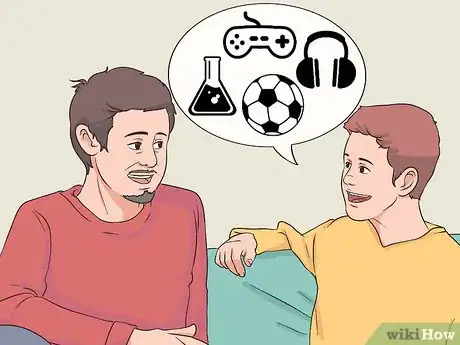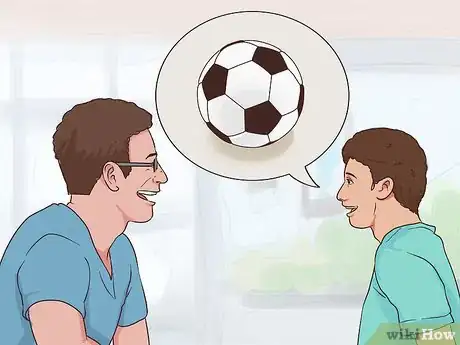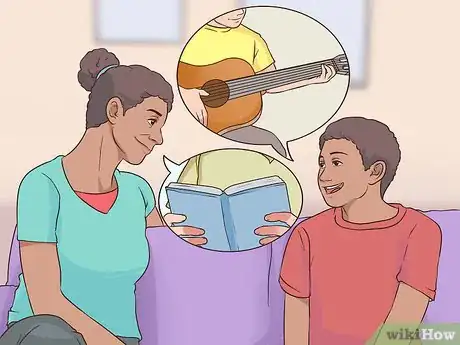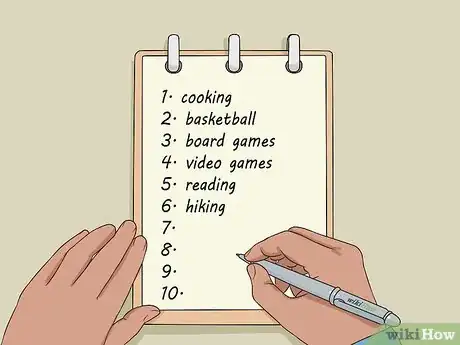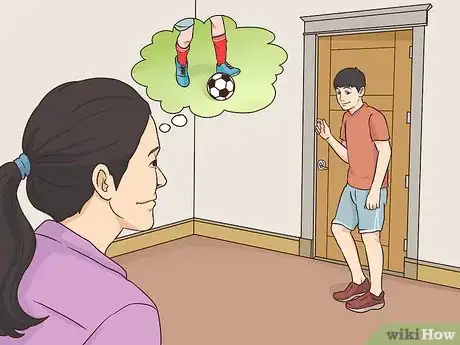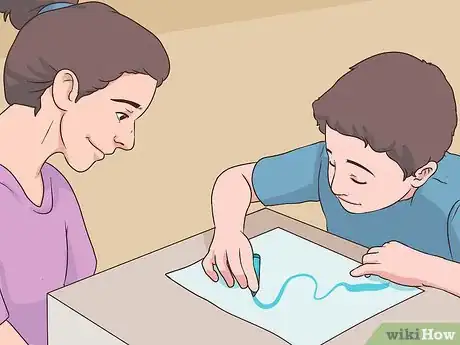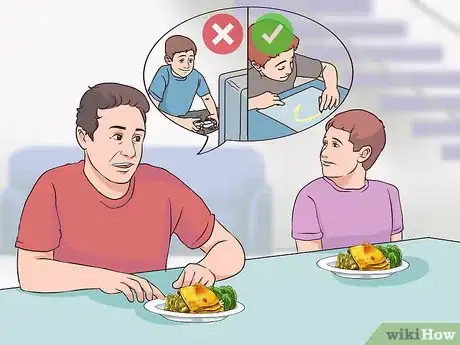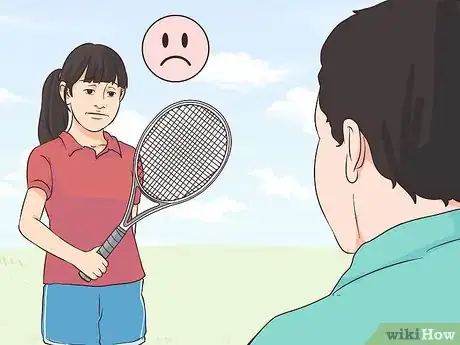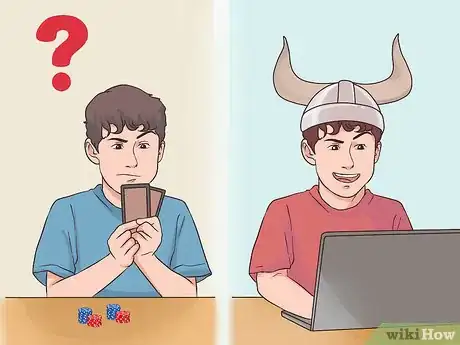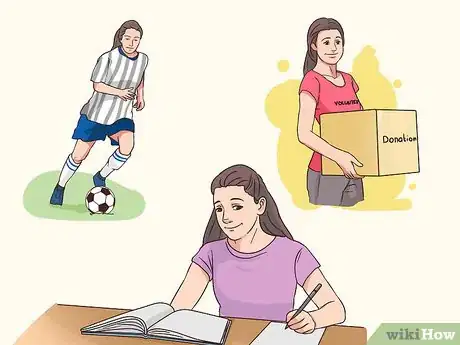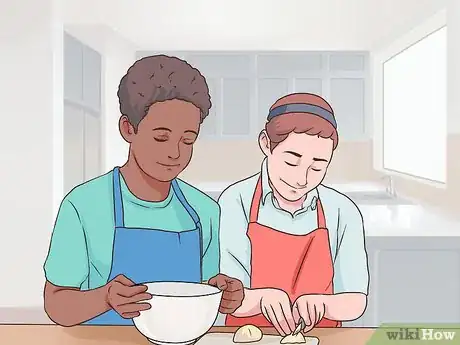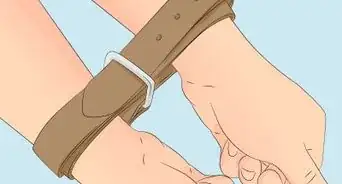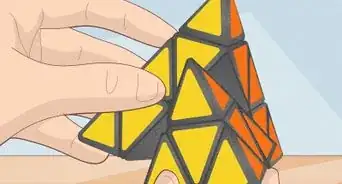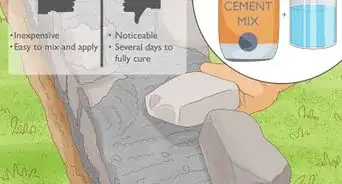This article was co-authored by Desiree Panlilio. Desiree Panlilio is a Teen Life Coach and the Owner of Encouraging Teens, LLC. With over three years of experience, she specializes in helping teens and young adults define roles, set goals, develop healthy academic and personal habits, grow in leadership potential, and create their life paths. Desiree holds a BSN in Nursing from The University of Victoria and an MA in Human Services Counseling with a concentration in Life Coaching from Liberty University.
There are 8 references cited in this article, which can be found at the bottom of the page.
This article has been viewed 68,655 times.
Getting your teen involved in a hobby is a great way to motivate them to explore their interests, get active, meet new people, and maybe even stay out of trouble. Our guide will show you how to use insight and gentle guidance to help your teen find their perfect pastime!
Steps
Talking to Your Teen About Hobbies
-
1Ask your teen what makes them feel good about themselves.[1] One way to help a teenager find a hobby is to focus on their strengths and what makes them feel good. Many teens may only focus on weakness or things they have failed at. Instead, emphasize anything that they enjoy doing or that makes them happy.[2]
- For example, your teen may be interested in music, sports, computers, crafting, role playing games, or science.
- A person doesn’t have to be good at a hobby to enjoy it. Hobbies aren’t necessarily talents. If your teen loves to play an instrument or a sport but is just mediocre, that’s okay! As long as they feel good while doing it, it can turn into a hobby.
-
2Ask your teen what they want to do.[3] Maybe your teen has been wanting to try something for a long time but has been unsure if you would agree to it. However, you might just get a shrug in response. That is normal; asking "what do you want to do?" is a pretty vague and broad question. Tell your teen to think about it, and then ask them about it later.[4]
- Try asking, "What would you like to do today?" or "What do you want to do this weekend?" You might also try saying, "Let's do something you are interested in today. What would you like to do?"
- If your kid wants to cook often or likes to be outside, you may be close to figuring out a good hobby for them.
Advertisement -
3Determine if your teen already participates in hobbies.[5] Teenagers spend much of their life away from the eyes of parents and don’t always offer up information. As a result, sometimes adults are not entirely aware that adolescents are developing hobbies. Your child may be developing hobbies away from home, so you may not have to encourage them to adopt new ones. Instead, you can support their current hobbies.[6]
- Ask your teen what they do to relax and unwind besides electronic devices, video games and the like. They may be listening to music, sketching, making a photo project or creating a blog and you may not fully realize it.
- Realize that not all hobbies are big projects, flashy, or occupy a lot of time. The teen that collects heart-shaped rocks may have a different type of hobby than one that makes her own YouTube videos, but they are both hobbies.
Finding Ideas for Hobbies
-
1Brainstorm ideas with your teen. Teens need time to think about what their passions and interests are, especially if they don’t already know. Support them as they try to figure out what enjoy and try new things.[7] You may even brainstorm with them. List all ideas, even if they sound stupid or impossible at first. Sometimes a flippant remark ends up being a brilliant idea![8]
- Good ideas for hobbies include fencing, reading or drawing manga, creating movies or music, cooking, playing an instrument, participating in quiz bowl, playing board or RPG games, or crafting.
-
2Have the teen make an interest list. After brainstorming, have your teen write down a list of interests they would like to pursue or be curious about. Then, have the teen rank the interests on a scale from 1 to 10, with one being most likely to try and 10 being least likely.[9]
- For example, your teen might list cooking, basketball, board games, video games, reading, and hiking. After they make the list, have them put them in order based on which ones they want to do the most.
- This list can help your teen start figuring out what they are more interested in so they can try the activity. If they don’t like the activity, they can move on to the next activity on the list.
-
3Analyze the teen’s personality. A person’s personality can help them figure out hobbies or interests. Think about your teen. What are their character traits? What things do they get in trouble for doing? What do they gravitate towards? The answers to these questions can help them come up with ideas.[10]
- For example, if your teen is chatty, they may enjoy something like debate, volunteer work, or drama. If your teen would rather be outside than doing homework, they may be interested in nature or sports.
-
4Search for opportunities you think your teen might like. A good time for looking into new opportunities is in a transition phase, like before a new school year or at the start of the summer holidays. These are times that various organizations, clubs, and teams are starting up.[11]
- You can look for camps or extra-curricular activities. At schools and camps, there is usually a system where teens are exposed to and encouraged to try out various interests, often without a full commitment.
-
5Suggest ideas for interests. If your teen is struggling to find interests, you can gently suggest things they might be interested it. You have likely known your child their entire life, so you will have an idea of what their interests are.[12]
- For example, you can say, "You like being outdoors. Have you thought about running, hiking, or camping?" or "There's a teen program for crafts this summer. I thought you might be interested."
- Remember, it is easy to go from insightful and helpful to nagging and suffocating. Teenagers dislike being pushed into things by parents, and it may take finesse to coax adolescents into action.
- Mention possible enjoyable activities, but limit the number of times you suggest the idea.
Creating a Positive Environment for Hobbies
-
1Be supportive of your teen’s hobbies, even if they seem odd. Your teen may not like all the things you like, or theirs you don’t understand. Don’t discourage them or tell them how weird you find it. This could hurt a core part of your teen’s identity. Instead, support their interests as long as it is safe, does not detract from healthy relationships, and so on. [13]
- It would be terrible to convince your teen to do something and then be too busy to help them enjoy it. Always be proud of what your teen accomplishes.
- If you know a lot about the hobby, offer a small amount of constructive criticism if asked.
- Avoid taking over a project. Remember, this is their hobby and project, not yours.
-
2Structure life to support hobbies. One of the most important things you can do is help structure family life so that there is time to enjoy hobbies.This means making sure there is some free time for the teen, along with making sure this free time is not devoured by things like video games, social media, and TV.[14]
- Provide resources and support. You are probably the one in charge of funding the hobbies to some extent. You may also have knowledge, expertise, and social connections that might help out.
- Place limits on media use. For example, no video games after dinnertime. Instead, your teen can spend time on their hobby.
- Avoid over-scheduling. Sometimes there is a fine line between a happily occupied, busy kid and one that has no time to just hang around with friends at the comic book store.
-
3Participate in a hobby of your own. You are most likely to get a positive response to your teen choosing a hobby if you engage in hobbies. By participating in a hobby, you are modeling how rewarding and fun hobbies can be and how important they are for a balanced life.[15]
- For example, if you want your child to read for fun, model this behavior by reading in your spare time and talking about books.
-
4Respect your teen’s changing interests. Teenagers are constantly changing, growing, and discovering new things. If your child does not want to do a hobby, respect it. A teen may have been really excited about knitting last year, but not this year.[16]
- Insisting your teen finish a class, camp, or semester is sometimes a tough call. Some teens have a tendency to give up too easily and need a parent to help prevent them from quitting too quickly. Generally, insisting on finishing a certain amount of time will help prevent that, like a week-long tennis camp. However, if it really looks like a teen is not having fun, discontinuing the hobby may well be wise.
-
5Remember that your teen may not share your hobbies. Sure, doing things together is one of the great pleasures of being a parent. But parents and children may not share the same hobbies. The idea behind hobbies is to enjoy it for its own sake, whether or not your child shares the same hobbies. Don’t force your teen to like only what you like or discourage hobbies that you do not understand.[17]
- For example, it may be easy to make fun of a teen's achievements in Minecraft. But doing so would certainly put them off to opening up to you.
- Sometimes you may not think you have the exact same interest, but discover they are not so different. For instance, maybe your teen shows no interest in playing poker, but they love getting together and playing role-playing games.
Helping Your Teen Follow Through
-
1Realize that your teen may be very busy. Though you want your teen to cultivate all sorts of hobbies and interests, teenagers are very busy people. There are many things that occupy their time beyond school: sports, homework, work, volunteering, test prep, and driver's education. They may not have as much time for hobbies as they did a few years ago.[18]
- Teenagers are also developing a more sophisticated social life, which requires meeting up with friends, having romantic relationships, going to social events, and keeping in touch on text and social networks. Your teen may not have as much time to engage in hobbies as it may seem at first glance.
- Teenagers may need just plain "downtime" without yet another demand. Sometimes after a full day, he or she may not have the mental or physical energy to just do a hobby. He or she may just want to watch a video or have a soak in the tub. Demanding to do a hobby when exhausted is counter-productive.
-
2Provide opportunities for your child to participate in hobbies. You should encourage your child to engage in their hobbies, but do not demand it or put a lot of pressure on them. Forcing a teen to do something they do not want to do may result in the opposite outcome than you want.[19]
- For example, if you think your teen would enjoy sailing, a summer camp that offers sailing lessons is a great way of exploring. However, if they do not ultimately like sailing, that should be fine too.
-
3Suggest an activity with friends. Maybe your teen acts they could care less about a specific activity, but often teens will become interested if you let them do it with a friend. Suggest to your child that they join a club with a friend or bring a friend along when you take them to do the activity.
- For example, your child may enjoy cooking classes more with a friend instead of alone.
-
4Avoid forcing your teen to do any hobby. If you are tempted to force your teen to try something, it is unlikely to end well. It will only lead to resentment. There is probably a reason your teen didn't want to do the activity in the first place. Hobbies should be fun and geared towards a person’s interest, so forcing your teen to do anything goes against that idea.[20]
- If you are desperate, have your teen try something for just a week. Then stress that you'd really like them to continue, but in the end, this decision is not yours to make.
Expert Q&A
-
QuestionHow can I help my child find a hobby?
 Desiree PanlilioDesiree Panlilio is a Teen Life Coach and the Owner of Encouraging Teens, LLC. With over three years of experience, she specializes in helping teens and young adults define roles, set goals, develop healthy academic and personal habits, grow in leadership potential, and create their life paths. Desiree holds a BSN in Nursing from The University of Victoria and an MA in Human Services Counseling with a concentration in Life Coaching from Liberty University.
Desiree PanlilioDesiree Panlilio is a Teen Life Coach and the Owner of Encouraging Teens, LLC. With over three years of experience, she specializes in helping teens and young adults define roles, set goals, develop healthy academic and personal habits, grow in leadership potential, and create their life paths. Desiree holds a BSN in Nursing from The University of Victoria and an MA in Human Services Counseling with a concentration in Life Coaching from Liberty University.
Teen Life Coach Ask them what they're interested in! Figure out what's most important to them, and give them an opportunity to try out something new without committing to it.
Ask them what they're interested in! Figure out what's most important to them, and give them an opportunity to try out something new without committing to it. -
QuestionWhat are some cool hobbies for teenage guys?
 Desiree PanlilioDesiree Panlilio is a Teen Life Coach and the Owner of Encouraging Teens, LLC. With over three years of experience, she specializes in helping teens and young adults define roles, set goals, develop healthy academic and personal habits, grow in leadership potential, and create their life paths. Desiree holds a BSN in Nursing from The University of Victoria and an MA in Human Services Counseling with a concentration in Life Coaching from Liberty University.
Desiree PanlilioDesiree Panlilio is a Teen Life Coach and the Owner of Encouraging Teens, LLC. With over three years of experience, she specializes in helping teens and young adults define roles, set goals, develop healthy academic and personal habits, grow in leadership potential, and create their life paths. Desiree holds a BSN in Nursing from The University of Victoria and an MA in Human Services Counseling with a concentration in Life Coaching from Liberty University.
Teen Life Coach Try giving the guitar a try! Start with something simple, like a cheap guitar or ukulele, and see how you like it.
Try giving the guitar a try! Start with something simple, like a cheap guitar or ukulele, and see how you like it.
References
- ↑ Desiree Panlilio. Teen Life Coach. Expert Interview. 12 October 2021.
- ↑ https://www.additudemag.com/wheres-the-passion/
- ↑ Desiree Panlilio. Teen Life Coach. Expert Interview. 12 October 2021.
- ↑ http://www.goodhousekeeping.com/life/parenting/tips/a18330/nurture-your-childs-interests/
- ↑ Desiree Panlilio. Teen Life Coach. Expert Interview. 12 October 2021.
- ↑ http://www.goodhousekeeping.com/life/parenting/tips/a18330/nurture-your-childs-interests/
- ↑ Desiree Panlilio. Teen Life Coach. Expert Interview. 12 October 2021.
- ↑ https://www.additudemag.com/wheres-the-passion/
- ↑ https://www.additudemag.com/wheres-the-passion/
- ↑ https://www.additudemag.com/wheres-the-passion/
- ↑ https://www.healthyfamiliesbc.ca/home/articles/extracurricular-activities-interests-and-hobbies-teens
- ↑ http://www.goodhousekeeping.com/life/parenting/tips/a18330/nurture-your-childs-interests/
- ↑ https://www.healthychildren.org/English/ages-stages/teen/Pages/Ways-To-Build-Your-Teenagers-Self-Esteem.aspx
- ↑ https://www.healthyfamiliesbc.ca/home/articles/extracurricular-activities-interests-and-hobbies-teens
- ↑ https://www.verywell.com/teens-and-hobbies-2611264
- ↑ https://www.irishtimes.com/life-and-style/health-family/ask-the-expert-should-i-force-my-child-to-have-a-hobby-1.2643440
- ↑ http://www.succeedsocially.com/helpolderteenager
- ↑ https://www.healthyfamiliesbc.ca/home/articles/extracurricular-activities-interests-and-hobbies-teens
- ↑ https://www.healthyfamiliesbc.ca/home/articles/extracurricular-activities-interests-and-hobbies-teens
- ↑ https://www.irishtimes.com/life-and-style/health-family/ask-the-expert-should-i-force-my-child-to-have-a-hobby-1.2643440
